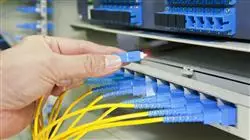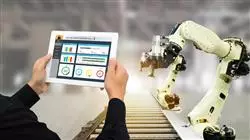University certificate
The world's largest faculty of information technology”
Introduction to the Program
Be able to create sensors applicable to industrial Electronic Systems and become a leading specialist in the sector"

This Postgraduate Diploma in Instrumentation and Sensors in Electronic Systems at TECH offers specialized knowledge to IT professionals so that they can develop professionally in a field that requires a high qualification. Thus, the program is aimed at both recent graduates and computer scientists with extensive experience, but who wish to update their knowledge with the latest information.
Specifically, the program analyzes the different types of sensors and actuators found in industrial processes and specifies the types of control systems in order to understand the intervention of an actuating device depending on a physical or chemical variable to be measured. In addition, the course develops specialized knowledge on current applications of power electronics, specifically devices that allow variation of the waveform of the electrical signal, known as converters. These devices are present in sectors as varied as domestic, industrial, military and aerospace.
It also shows the communication networks that are necessary for the transfer of data between all the elements of an industrial production system. In this way, controllers can communicate with sensors and other instrumentation elements, as well as with management systems, databases and even with services deployed in the cloud. Fundamental elements for this type of tools.
In short, this is a 100% online Postgraduate Diploma that will allow students to distribute their study time, not being restricted by fixed schedules or having to move to another physical location, being able to access all the contents at any time of the day, balancing their work and personal life with their academic life.
A first class program, aimed at improving your professional skills”
This Postgraduate diploma in Instrumentation and Sensors in Electronic Systems is the most complete and up-to-date academic program on the market. The most outstanding characteristics of this program are:
- Practical cases presented by experts in information technology
- The graphic, schematic, and practical contents with which they are created, provide scientific and practical information on the disciplines that are essential for professional development
- Practical exercises where self-assessment can be used to improve learning
- Special focus on innovative methodologies in Instrumentation and Sensors in Electronic Systems
- Theoretical lessons, questions to the expert, debate forums on controversial topics, and individual reflection assignments
- Content that is accessible from any fixed or portable device with an Internet connection
Studying this Postgraduate diploma will provide you with the keys to specialize in instrumentation and sensors in electronic systems and become a successful professional”
Its teaching staff includes professionals from the field of IT, who bring to this program the experience of their work, as well as renowned specialists from leading societies and prestigious universities.
The multimedia content, developed with the latest educational technology, will provide the professional with situated and contextual learning, i.e., a simulated environment that will provide an immersive training experience designed to train for real-life situations.
This program is designed around Problem-Based Learning, whereby the student must try to solve the different professional practice situations that arise throughout the program. For this purpose, the student will be assisted by an innovative interactive video system created by renowned and experienced experts.
TECH provides you with a multitude of practical cases that will be fundamental to your learning"

The online format of this program will give you the opportunity to self-manage your study time"
Why study at TECH?
TECH is the world’s largest online university. With an impressive catalog of more than 14,000 university programs available in 11 languages, it is positioned as a leader in employability, with a 99% job placement rate. In addition, it relies on an enormous faculty of more than 6,000 professors of the highest international renown.

Study at the world's largest online university and guarantee your professional success. The future starts at TECH”
The world’s best online university according to FORBES
The prestigious Forbes magazine, specialized in business and finance, has highlighted TECH as “the world's best online university” This is what they have recently stated in an article in their digital edition in which they echo the success story of this institution, “thanks to the academic offer it provides, the selection of its teaching staff, and an innovative learning method aimed at educating the professionals of the future”
A revolutionary study method, a cutting-edge faculty and a practical focus: the key to TECH's success.
The most complete study plans on the university scene
TECH offers the most complete study plans on the university scene, with syllabuses that cover fundamental concepts and, at the same time, the main scientific advances in their specific scientific areas. In addition, these programs are continuously being updated to guarantee students the academic vanguard and the most in-demand professional skills. In this way, the university's qualifications provide its graduates with a significant advantage to propel their careers to success.
TECH offers the most comprehensive and intensive study plans on the current university scene.
A world-class teaching staff
TECH's teaching staff is made up of more than 6,000 professors with the highest international recognition. Professors, researchers and top executives of multinational companies, including Isaiah Covington, performance coach of the Boston Celtics; Magda Romanska, principal investigator at Harvard MetaLAB; Ignacio Wistumba, chairman of the department of translational molecular pathology at MD Anderson Cancer Center; and D.W. Pine, creative director of TIME magazine, among others.
Internationally renowned experts, specialized in different branches of Health, Technology, Communication and Business, form part of the TECH faculty.
A unique learning method
TECH is the first university to use Relearning in all its programs. It is the best online learning methodology, accredited with international teaching quality certifications, provided by prestigious educational agencies. In addition, this disruptive educational model is complemented with the “Case Method”, thereby setting up a unique online teaching strategy. Innovative teaching resources are also implemented, including detailed videos, infographics and interactive summaries.
TECH combines Relearning and the Case Method in all its university programs to guarantee excellent theoretical and practical learning, studying whenever and wherever you want.
The world's largest online university
TECH is the world’s largest online university. We are the largest educational institution, with the best and widest online educational catalog, one hundred percent online and covering the vast majority of areas of knowledge. We offer a large selection of our own degrees and accredited online undergraduate and postgraduate degrees. In total, more than 14,000 university degrees, in eleven different languages, make us the largest educational largest in the world.
TECH has the world's most extensive catalog of academic and official programs, available in more than 11 languages.
Google Premier Partner
The American technology giant has awarded TECH the Google Google Premier Partner badge. This award, which is only available to 3% of the world's companies, highlights the efficient, flexible and tailored experience that this university provides to students. The recognition as a Google Premier Partner not only accredits the maximum rigor, performance and investment in TECH's digital infrastructures, but also places this university as one of the world's leading technology companies.
Google has positioned TECH in the top 3% of the world's most important technology companies by awarding it its Google Premier Partner badge.
The official online university of the NBA
TECH is the official online university of the NBA. Thanks to our agreement with the biggest league in basketball, we offer our students exclusive university programs, as well as a wide variety of educational resources focused on the business of the league and other areas of the sports industry. Each program is made up of a uniquely designed syllabus and features exceptional guest hosts: professionals with a distinguished sports background who will offer their expertise on the most relevant topics.
TECH has been selected by the NBA, the world's top basketball league, as its official online university.
The top-rated university by its students
Students have positioned TECH as the world's top-rated university on the main review websites, with a highest rating of 4.9 out of 5, obtained from more than 1,000 reviews. These results consolidate TECH as the benchmark university institution at an international level, reflecting the excellence and positive impact of its educational model.” reflecting the excellence and positive impact of its educational model.”
TECH is the world’s top-rated university by its students.
Leaders in employability
TECH has managed to become the leading university in employability. 99% of its students obtain jobs in the academic field they have studied, within one year of completing any of the university's programs. A similar number achieve immediate career enhancement. All this thanks to a study methodology that bases its effectiveness on the acquisition of practical skills, which are absolutely necessary for professional development.
99% of TECH graduates find a job within a year of completing their studies.
Postgraduate Diploma in Instrumentation and Sensors in Electronic Systems
.
Dive into the exciting world of instrumentation and sensors in electronic systems through our Postgraduate Diploma program at TECH Global University. Discover how to master the most advanced technologies and expand your skills in this constantly evolving field, all from the comfort of your online classes. At TECH Global University, we understand the importance of instrumentation and sensors in the field of electronic systems. Our program will provide you with the knowledge you need to understand and apply the latest trends in sensor, data acquisition, instrumentation and control technology. Online classes offer a number of benefits that will allow you to get the most out of your educational experience. You will be able to access the content at any time and from anywhere, adapting your studies to your schedule and pace of life. In addition, you will have the support of our highly qualified teaching staff, who will be available to answer your questions and provide you with personalized guidance.
Power your computer knowledge with TECH
.
TECH Global University stands out for its practical and application-oriented approach to knowledge. During this Postgraduate Diploma program, you will learn to design, implement and calibrate electronic instrumentation and sensor systems, preparing you to meet real-world challenges. The demand for professionals with knowledge in instrumentation and sensors in electronic systems is constantly growing in various industries, such as automotive, manufacturing and technology. Become an expert in this growing field and expand your career opportunities. Don't miss the opportunity to enhance your knowledge in instrumentation and sensors in electronic systems. Enroll in our Postgraduate Diploma program and acquire the skills you need to excel in the field of computer science and technology. Get ready to boost your career in electronic systems and become a highly skilled professional in instrumentation and sensors! Join TECH Global University and make a difference in the world of computing.







